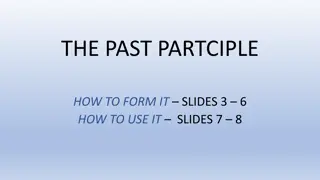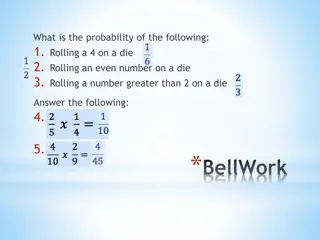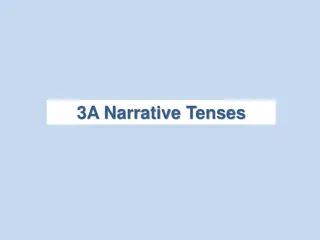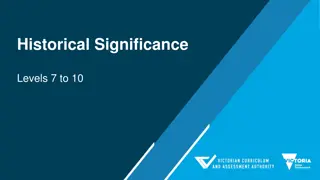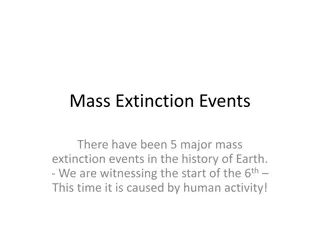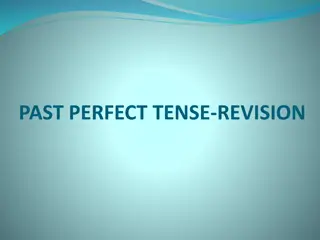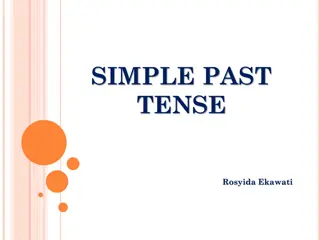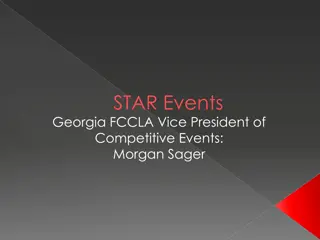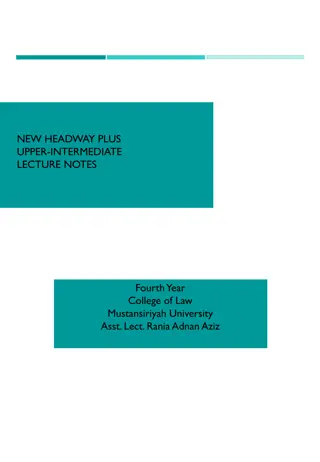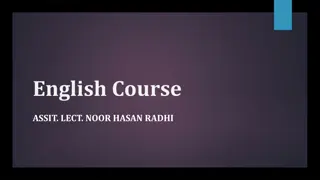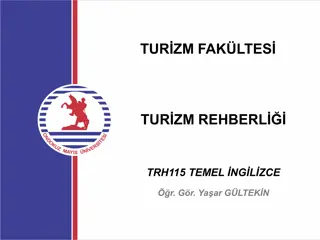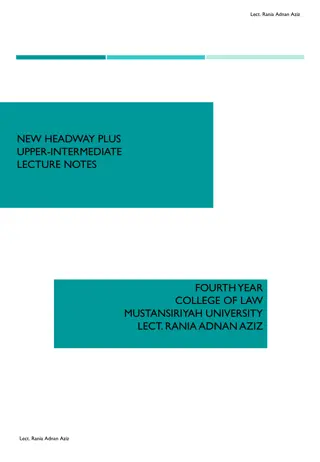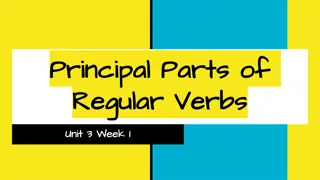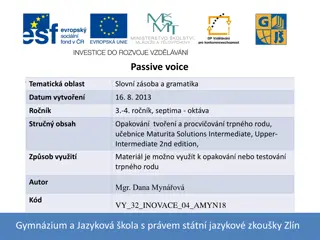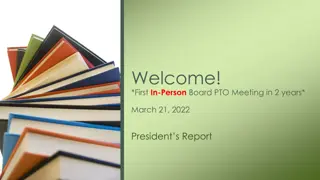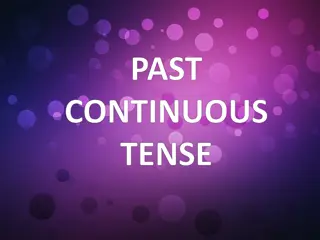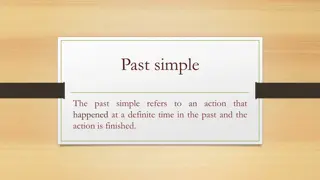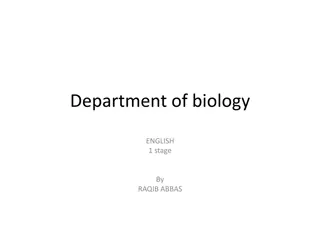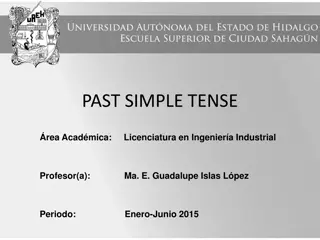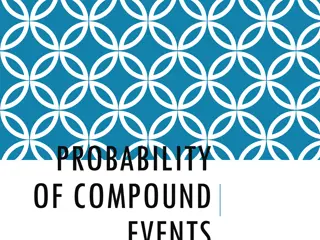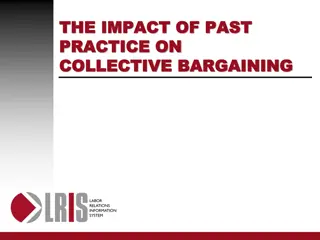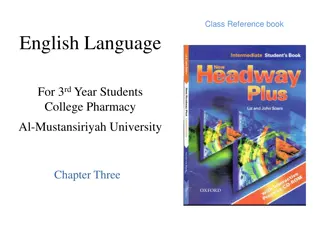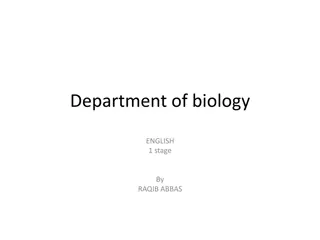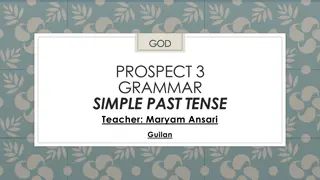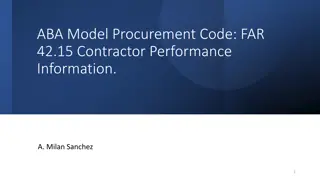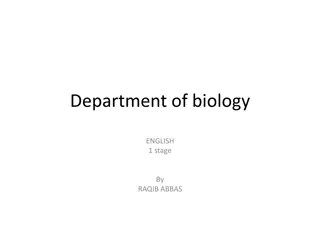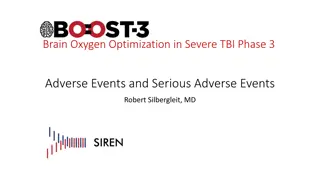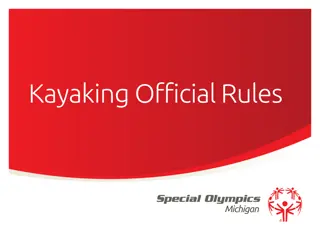Learn Past Continuous Tense - Grade 6 English Lesson
This Grade 6 English lesson focuses on understanding and correctly using the past continuous tense. It covers the rules for forming the past continuous tense, examples of its usage, and an assessment to test comprehension. Students will practice talking about actions happening at specific times in t
4 views • 6 slides
Understanding Adverse Events Following Immunization (AEFI)
Adverse Events Following Immunization (AEFI) are medical incidents that occur after immunization, potentially caused by the vaccine, leading to unfavorable symptoms. Pharmacovigilance plays a crucial role in detecting, assessing, and preventing these events. AEFI can impact immunization programs at
2 views • 40 slides
Understanding Present vs. Past Tenses in English Grammar
Exploring the basics of present and past tenses in English grammar, covering affirmative, negative, and interrogative structures, as well as adverbs of frequency and quantity. Learn about describing general facts, habitual actions, and specific past events through detailed examples and visual aids.
8 views • 13 slides
Learning Past Continuous Tense with Pronouns and Forming Questions
Explore how to use pronouns with "was" and "were" in the past continuous tense through examples and practice sentences. Learn to form questions using the past continuous tense and develop an understanding of when to use "was" or "were" with different subjects. Improve your grammar skills with this l
9 views • 15 slides
Mastering the Past Participle in English Verbs
Understand how to form and use the past participle in English verbs, both regular and irregular. Learn the rules for forming regular past participles, including when to double consonants and when to change 'y' to 'i'. Discover examples of irregular verbs and how their past participles are formed. Ex
0 views • 8 slides
Understanding Probability in Events
Explore concepts of probability in various events like rolling a die, compound events, simple events, and spinner probability. Learn how to calculate probabilities of different outcomes and understand the difference between single and compound events. Discover key principles in probability theory an
0 views • 13 slides
Understanding Past Tenses in Narratives
Exploring the use of past simple, past continuous, past perfect, and past perfect continuous tenses in narratives with examples and explanations. Learn how to convey different past events and their relationships in storytelling.
1 views • 4 slides
Understanding Historical Significance in Victorian Curriculum History
Exploring historical significance levels 7 to 10 in the Victorian Curriculum History, this content delves into the importance of evaluating the past, identifying patterns of change, and assessing the influence of individuals and groups. Students learn to analyze causes, effects, motives, and interpr
0 views • 48 slides
Learning to Tell Time in Minutes: Minutes Past the Hour
Explore how to tell the time in minutes past the hour by counting clockwise in intervals of five and then adding single minutes to find the exact time. Practice identifying time expressions like "quarter past" and "half past" as well as reading the time to the nearest minute.
0 views • 24 slides
Earth's History: Mass Extinction Events and Human Impact
Earth's history spans over billions of years, marked by significant events including mass extinction events that have shaped life on the planet. There have been five major mass extinction events in the past, with the sixth one currently underway, driven by human activities impacting the environment.
2 views • 9 slides
Mastering the Past Perfect Tense: A Comprehensive Guide
Explore the intricacies of the past perfect tense through engaging examples of two different events at different times in the past, understanding how to form sentences correctly and use time expressions effectively. Dive into exercises to enhance your grasp of the past perfect tense.
0 views • 10 slides
Understanding Historical Research: Methods, Purposes, and Aims
Historical research involves investigating past events systematically to provide a dynamic explanation, interpretation, and understanding of the past. It aims to uncover unknown aspects, answer unexplored questions, and link past happenings to the present to enrich human culture and encourage interd
0 views • 20 slides
Understanding Simple Past Tense in English Grammar
Explore the usage of simple past tense through examples, irregular verbs, and regular verb forms. Learn how to form affirmative, negative, and question sentences in the past. Enhance your understanding of past actions and events with clear explanations and practice exercises.
1 views • 19 slides
Guide to Participating in STAR Events in Georgia FCCLA
Discover the significance of STAR Events in Georgia FCCLA, competitive events acknowledging proficiency in various projects, leadership, and career readiness. Learn how to select individual or team events, choose a suitable project, and initiate your project effectively. Empower yourself to excel in
0 views • 19 slides
Understanding Regular and Irregular Verbs in Simple Past Tense
Learn how to form the simple past tense with regular and irregular verbs. Regular verbs end in "-ed," while irregular verbs have unique past tense forms. Examples and images illustrate the differences, helping you master past tense verb usage effortlessly.
0 views • 11 slides
Understanding the Present Perfect Tense in English Grammar
The lecture notes explore the Present Perfect tense, highlighting its connection between past actions and their relevance in the present. It compares the Past and Present Perfect tenses, discussing the nuanced differences and providing examples for clarity. The document covers the usage of the Prese
0 views • 8 slides
Understanding the Past Perfect Tense in English Grammar
The Past Perfect Tense is used to talk about actions completed before a certain point in the past, emphasizing the sequence of events. This tense follows the structure of "had + past participle" and is crucial for expressing events that happened earlier than others in a narrative. Knowing how to for
0 views • 27 slides
Understanding Simple Past Tense and Passive Voice Formation
The provided content covers the usage of simple past tense to discuss past events and the formation of passive voice in English grammar. Examples and explanations are given, along with vocabulary exercises and an apology scenario. Learn about making past verbs negative, forming passive sentences, an
0 views • 5 slides
Understanding Simple Past Tense in English: Rules and Examples
The simple past tense is a fundamental form in Modern English used to describe past events. It involves regular verbs adding "-ed" and irregular verbs having different forms. The construction of the simple past helps distinguish it from other past tense forms like past perfect and past progressive.
0 views • 33 slides
Understanding Narrative Tenses: Past Simple, Present Perfect, and Past Continuous
Explore the nuances of narrative tenses through detailed lecture notes by Lecturer Rania Adnan Aziz. Learn the differences between Past Simple and Present Perfect, grasp the usage of Past Continuous, and understand the significance of Past Perfect in expressing past actions and timelines. Dive into
0 views • 6 slides
Understanding the Past Perfect Tense in English Grammar
The past perfect tense expresses actions that occurred before another action in the past, referring to time up to a point in the past. It is often used in reported speech and formal writing to indicate completed actions before a specific event. The past perfect progressive tense emphasizes the durat
0 views • 15 slides
Understanding Principal Parts of Regular Verbs and Practice Exercises
Explore the principal parts of regular verbs including present, present participle, past, and past participle forms. Understand how regular verbs form their past and past participle, practice exercises to identify verb forms in sentences, and learn about verb conjugation rules.
0 views • 6 slides
Understanding Verb Tenses: Present Perfect and Past Perfect Forms
Explore the usage of present perfect and past perfect verb forms to indicate relationships of time and cause. Present perfect verbs denote actions with undefined past timing but relevance to the present, while past perfect verbs describe events that occurred before another past event. Examples and e
0 views • 7 slides
Understanding Passive Voice: Rules and Examples
Passive voice is a grammatical construction used when the focus is on the action itself rather than the doer. It is formed by combining a form of "to be" with the past participle of a verb. This content explores the usage of passive voice in different tenses - present simple, present continuous, pas
0 views • 14 slides
RMS PTO Board Meeting Update and Event Schedule
The recent RMS PTO board meeting covered various topics such as budget tracking, upcoming events, and recent activities. Discussions included PayPal usage, budget allocations for future fundraisers, expenses, and a review of recent events. The meeting also outlined an array of events planned for the
0 views • 7 slides
Understanding the Past Continuous Tense
The Past Continuous Tense is used to describe interrupted activities that continued for a period in the past or things happening continuously in the past. Learn how to form affirmative, interrogative, and negative sentences in this tense with examples and images.
0 views • 12 slides
Understanding the Past Simple Tense in English Grammar
The past simple tense refers to actions that occurred at a specific time in the past and are now completed. This tense follows a specific rule where the subject is combined with a verb (regular or irregular) and a complement. Adverbs like "yesterday," "ago," and "last" are commonly used with past si
0 views • 9 slides
Understanding Past Simple Tense in English Grammar
The past simple tense is used to describe completed actions or events that happened at a specific time in the past. Regular verbs form the past simple by adding "-ed", while irregular verbs have unique past tense forms. The structure for negative and question forms involves the auxiliary verb "did".
0 views • 6 slides
Understanding Past Simple Tense in Academic Settings
The Past Simple Tense, a fundamental topic in academic coursework, introduces regular and irregular verb forms, spelling rules, and the use of the verb "to be" in past actions and events. Understanding these concepts enhances language proficiency and communication skills in foreign languages.
0 views • 15 slides
Understanding Probability of Compound Events
Compound events involve multiple outcomes occurring together, such as independent events where one outcome does not affect another, and dependent events where one outcome affects the other. Complement sets, card probabilities, and mutually exclusive events are also discussed, providing a comprehensi
0 views • 15 slides
Understanding the Impact of Past Practices on Collective Bargaining
Exploring the significance of past practices in interpreting, supplementing, and potentially contradicting contract language within the context of collective bargaining. Covering topics such as the definition of past practices, the duty to bargain, waivers of protest rights, and remedies for unlawfu
0 views • 35 slides
Understanding Past Tenses in English for 3rd Year College Pharmacy Students
Dive into the intricacies of past tenses in English as you explore the nuances between past simple, past continuous, past perfect, and more. Test your grammar skills while learning to express events that occurred in the past, with a focus on practical application for students at Al-Mustansiriyah Uni
0 views • 25 slides
Understanding Past Perfect Tense in English Grammar
Past Perfect Tense is used to denote actions that were completed before another action occurred in the past. It is formed using the auxiliary verb "had" followed by a past participle. Examples of affirmative, negative, and question forms are provided to illustrate usage. The tense helps in sequencin
0 views • 4 slides
Noise Control Measures and Community Preferences at the Corn Exchange
Various images and references discuss the history of amplified music events at the Corn Exchange, noise complaints leading to control methods by the FTC, impacts on events and community preferences post-control, and survey findings on participant demographics, noise effects, and desired public event
0 views • 19 slides
Common Regular Verbs and Their Past Tenses
Common regular verbs and their past tenses are essential aspects of grammar learning. Past tense forms of verbs are used to indicate actions or states that have already occurred. Examples of regular verbs and their corresponding past tenses are provided in this content, along with spelling rules for
0 views • 17 slides
Understanding Simple Past Tense in Grammar
In this file, we delve into the concept of simple past tense in grammar. Through examples and explanations, you will learn how to use the simple past tense to talk about completed actions in the past. The structure, usage, and importance of simple past tense are covered extensively to enhance your u
0 views • 30 slides
Enhancing Federal Procurement Standards Through Past Performance Documentation
Proposal to add a FAR Subpart 42.15-like section to the MPC for recording Contractor Performance Information, in alignment with OMB guidance in 2 CFR Part 200. The history and importance of past performance evaluation in federal grants and agreements are highlighted, emphasizing the need for a struc
0 views • 13 slides
Understanding the Past Continuous Tense in English Grammar
Past Continuous Tense is used to describe ongoing actions in the past. It is formed with "was/were" + present participle (-ing). Learn its structure, usage, negation, and questioning forms with examples. Enhance your English grammar skills by mastering the Past Continuous Tense.
0 views • 4 slides
Brain Oxygen Optimization in Severe TBI: Adverse Events Analysis
This study led by Dr. Robert Silbergleit focuses on adverse events in brain oxygen optimization for severe Traumatic Brain Injury (TBI) patients. It outlines key points for reporting adverse events, discusses relatedness algorithms, and presents scenarios to analyze adverse events occurrence post-en
0 views • 24 slides
Official Kayaking Rules for Michigan Events
Official rules for kayaking events in Michigan including information on events offered, uniforms, equipment requirements, and general rules for athletes. Athletes can enter up to three events but must choose between Traditional or Unified events. The rules cover attire, required equipment such as li
0 views • 14 slides




